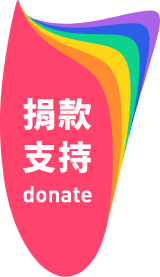NGO CSW 69 Participation Report: Addressing Women's and Gender-Diverse Communities' Common Challenges and Moving Forward Together
Date: 10–15 March 2025
Forum: NGO CSW 69
Location: New York, USA
TEC Delegation: Executive Director Joyce Teng, Researcher Yuanhsin Cheng
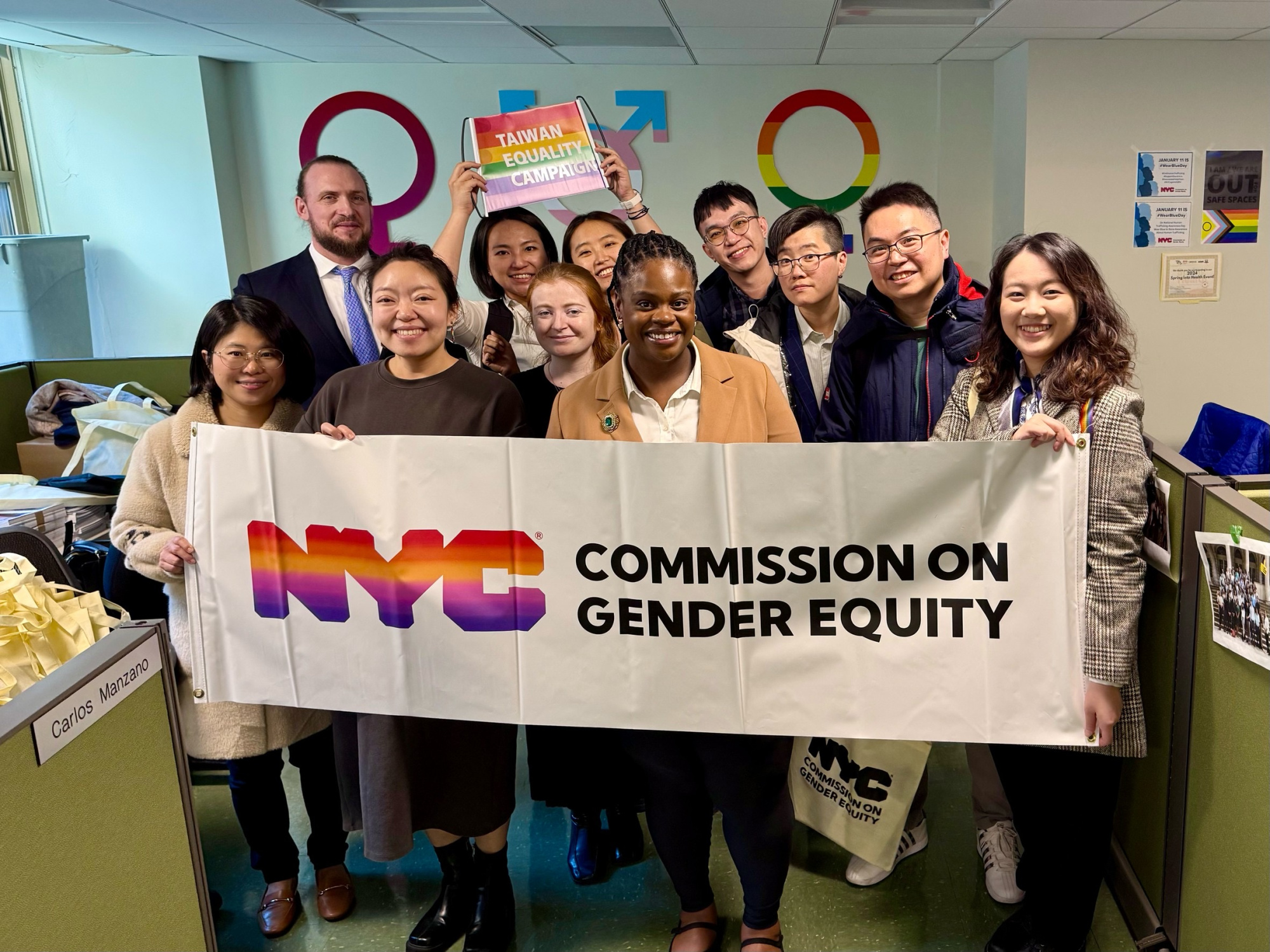
In March 2025, during the 69th session of the United Nations Commission on the Status of Women (CSW), the Taiwan Equality Campaign (TEC) participated in the NGO CSW parallel events in New York as a grassroots gender rights organisation. While CSW is the UN’s annual global platform focused on women's rights and gender equality, NGO CSW provides civil society groups the space to engage, share, and organise in parallel. As an organisation advocating for gender-diverse communities, TEC recognises the importance of finding intersections between women’s issues and gender-diverse rights. By creating spaces for dialogue and collaboration, we aim to build collective strategies with allies facing similar structural challenges.
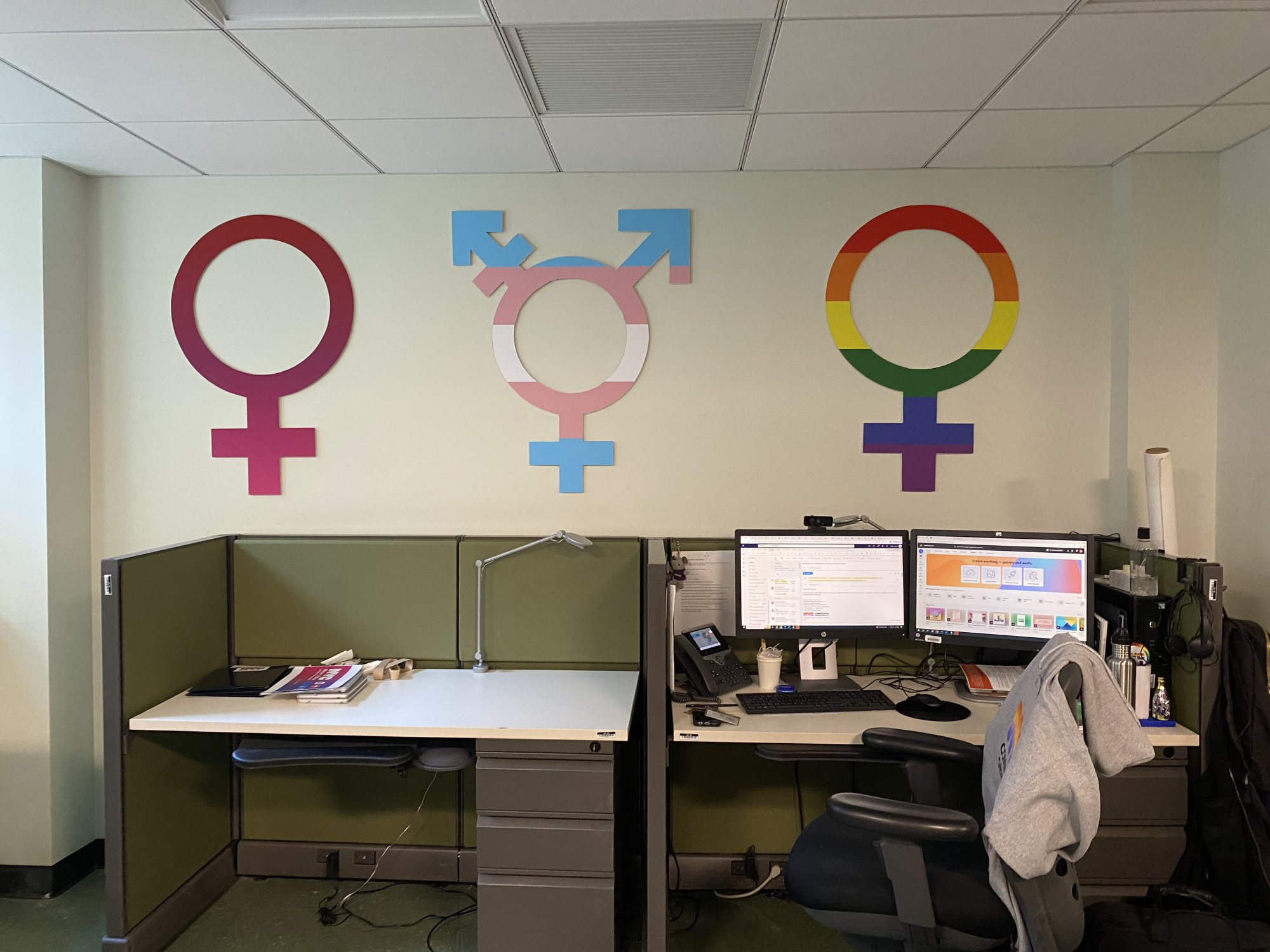
We Thrive Together: Women and Gender-Diverse Communities Are Not Opposite
Both CSW and NGO CSW are traditionally centred on “women” as a category, making it especially important for gender-diverse organisations to carve out space for a shared conversation—“women × gender-diverse communities.” In today’s global wave of anti-gender backlash, conservative narratives often pit the rights of cisgender women against those of trans and non-binary individuals, framing the conversation as binary and oppositional. However, in both history and practice, the struggles for women’s rights and gender-diverse individuals rights are deeply interconnected. These groups naturally support one another in the struggle against systemic oppression; they are not antagonistic. One partner from South Korea shared how, amid their near-weekly street protests, rainbow flags and slogans representing gender-diverse voices are consistently visible. The democratic struggle there actively includes LGBTQI+ demands.
How do we make sure no one is left behind as we advocate for inclusive laws and policies? We discovered during our visit to the New York City Commission on Gender Equity that even delayed gender initiatives gained momentum as the number of women on City Council rose, demonstrating the importance of representation. This realization is reflected in TEC's own Political Participation Training Program, which seeks to enable more gender-diverse people to enter political fields, contribute their distinct points of view, and transform public systems with a more expansive, inclusive vision.
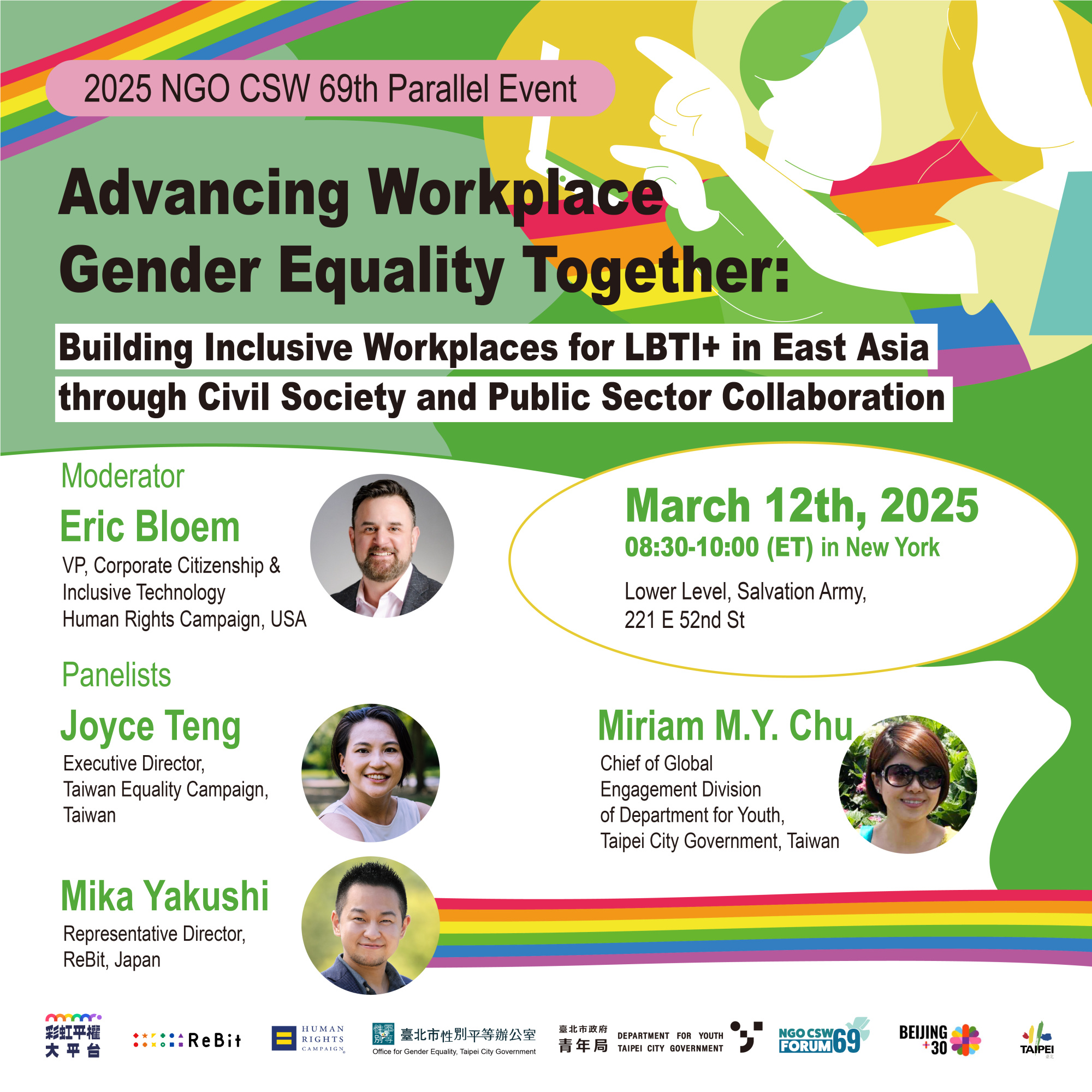
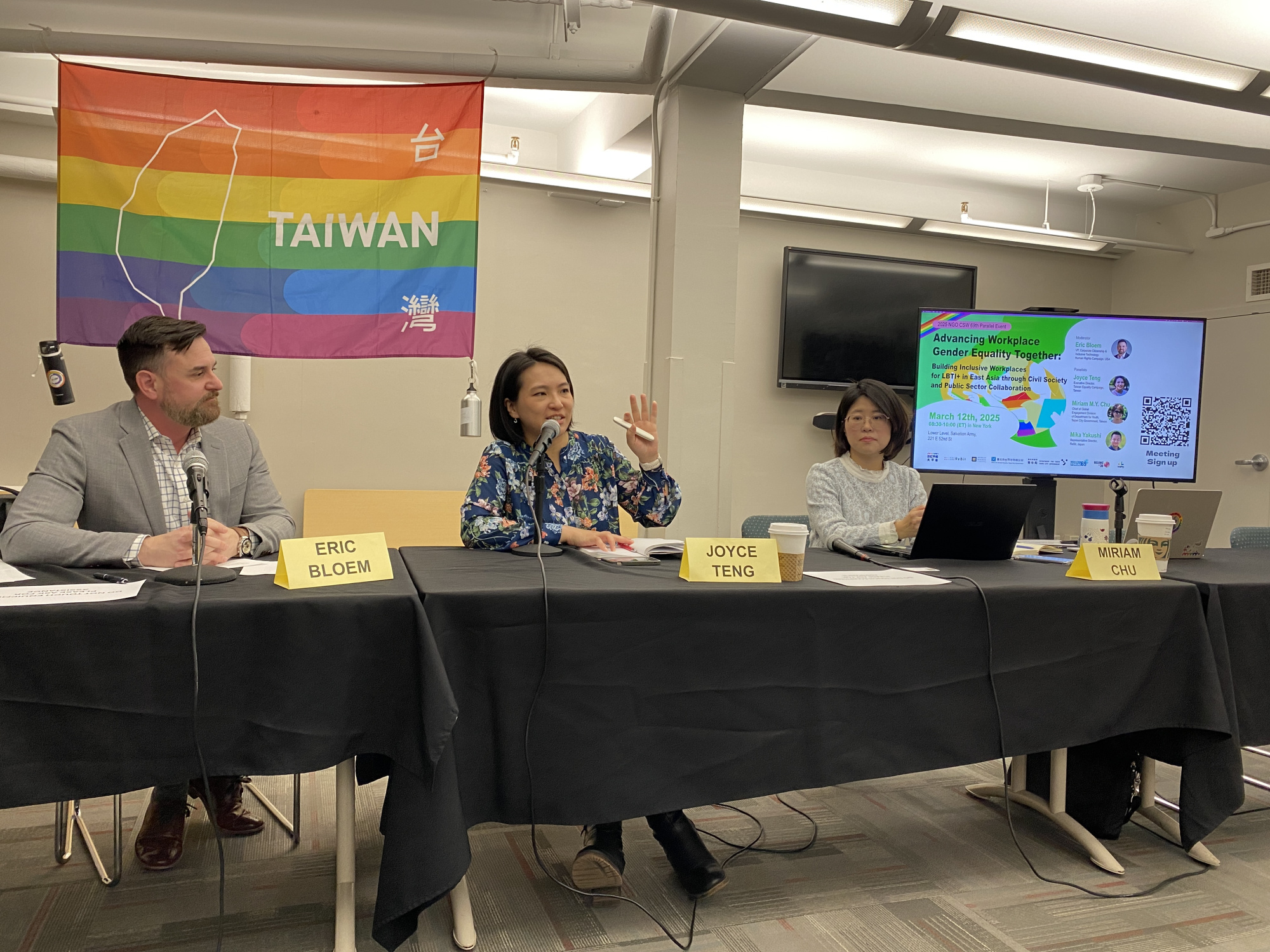
Inside the Conference: DE&I Under Threat—Creating New Languages for Equality
A recurring concern across recent international convenings has been the backlash against DEI (Diversity, Equity, and Inclusion) policies in the United States. For our NGO CSW session titled “Advancing Workplace Gender Equality Together: Building Inclusive Workplaces for LBTl+ in East Asia through Civil Society and Public Sector Collaboration”, TEC co-hosted with Human Rights Campaign (HRC), Department for Youth of Taipei City Government, and ReBit (Japan) to discuss inclusive workplace strategies in East Asia.TEC presented our ongoing Taiwan LGBTQI+ Workplace Equality Index project, developed in partnership with the Taiwan Tongzhi Hotline Association. This initiative provides corporations with clear action plans to improve internal DE&I, offering feedback and concrete policy recommendations based on their performance.
The recent political climate, however, has created real setbacks. In the U.S., HRC reported that over 800 DE&I-friendly companies now fear backlash under Trump-era policies and are withdrawing from previous commitments. In Taiwan, we observed similar resistance among international corporations, with local branches citing a lack of support from U.S. headquarters. Publicly endorsing DE&I may be viewed as politically risky, and business interests are often prioritised over equity. International partners agreed that the anti-gender trend has made it harder to carry out inclusion initiatives. Gender advocacy organizations are responding by employing new, more strategic language for equality. This move away from campaigning with expressions has brought the main topic back into the forefront: "How does DE&I actually improve people's lives?"
As global capital remains concentrated in elite and patriarchal systems, we continue to organise through visibility, resource sharing, and strategic alliances. In doing so, we build resilient networks for those still fighting for justice.
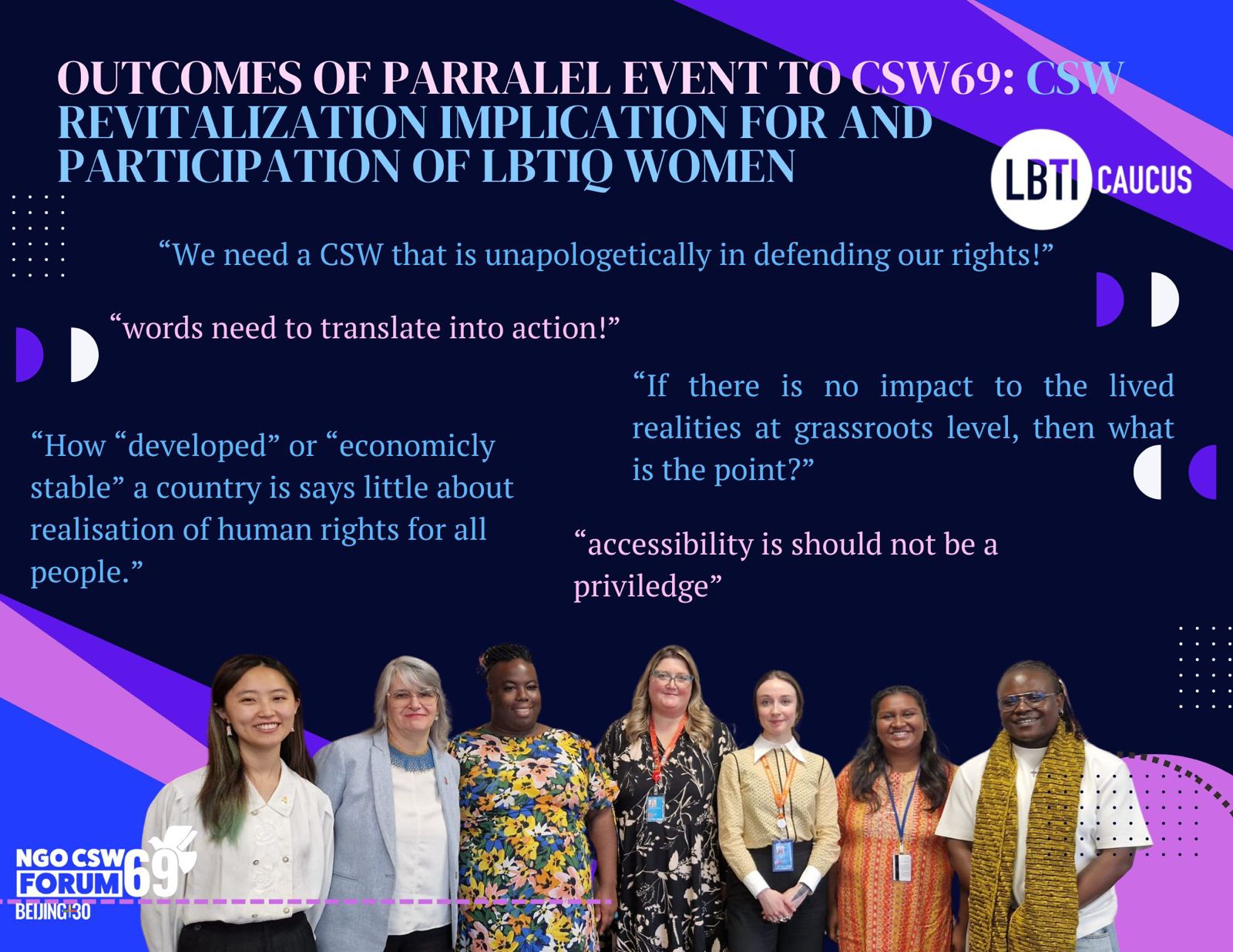
Between the Sessions: Critiquing Systems While Participating in Them
In addition to our scheduled actions, TEC took part in a session called "CSW Revitalization: Implication for and Participation of LBTIQ Women," which was sponsored by civil society. This discussion candidly criticized the CSW process, emphasizing the necessity of including grassroots viewpoints and marginalized people more fully.Taiwan is not officially able to participate in CSW since we are not a member of the UN. NGO CSW serves as our sole route for worldwide communication and serves as a reminder of Taiwan's distinct geopolitical location as well as the difficulties associated with international visibility.TEC, drawing from our intersectional and diverse identities, engaged in extensive dialogue with fellow participants on how CSW might more meaningfully implement inclusive practices—particularly in relation to information equity and grassroots accessibility. Together, we reflected on the current state of participation in CSW and identified multiple concerns that deserve critical attention within the broader pursuit of equality. For instance, the locations where the conferences are held and the languages used often impose invisible thresholds for participation; the differing policy environments in various countries can silence local communities and prevent them from presenting their realities at international venues; there remains a clear gap between the issues discussed in official meetings and the concrete action plans that follow; and even within the conference space itself, concerns over digital and information security persist.Our hope for CSW is that, in its efforts to advance justice through collective momentum, it does not allow the particularity of certain cases to render anyone invisible or excluded. At the session, Yuanhsin remarked: “I have come to realize that we don’t need to wait for an invitation into institutional spaces—we can support one another by sharing experiences and building coalitions on our own terms.”Across global civil society, participants bring distinct issue areas and timelines. Many non-Western allies raised critiques around race, class, and the lingering dynamics of colonialism. For TEC, one central question guides our reflections: how can we bring about meaningful, grounded change in various local contexts? The value and relevance of the methods and languages we employ must be assessed. We always remind ourselves to be alert—sensitive to local circumstances, responsive to contemporary realities, and dedicated to careful adaptation—even when we use frameworks or tools created in the West.
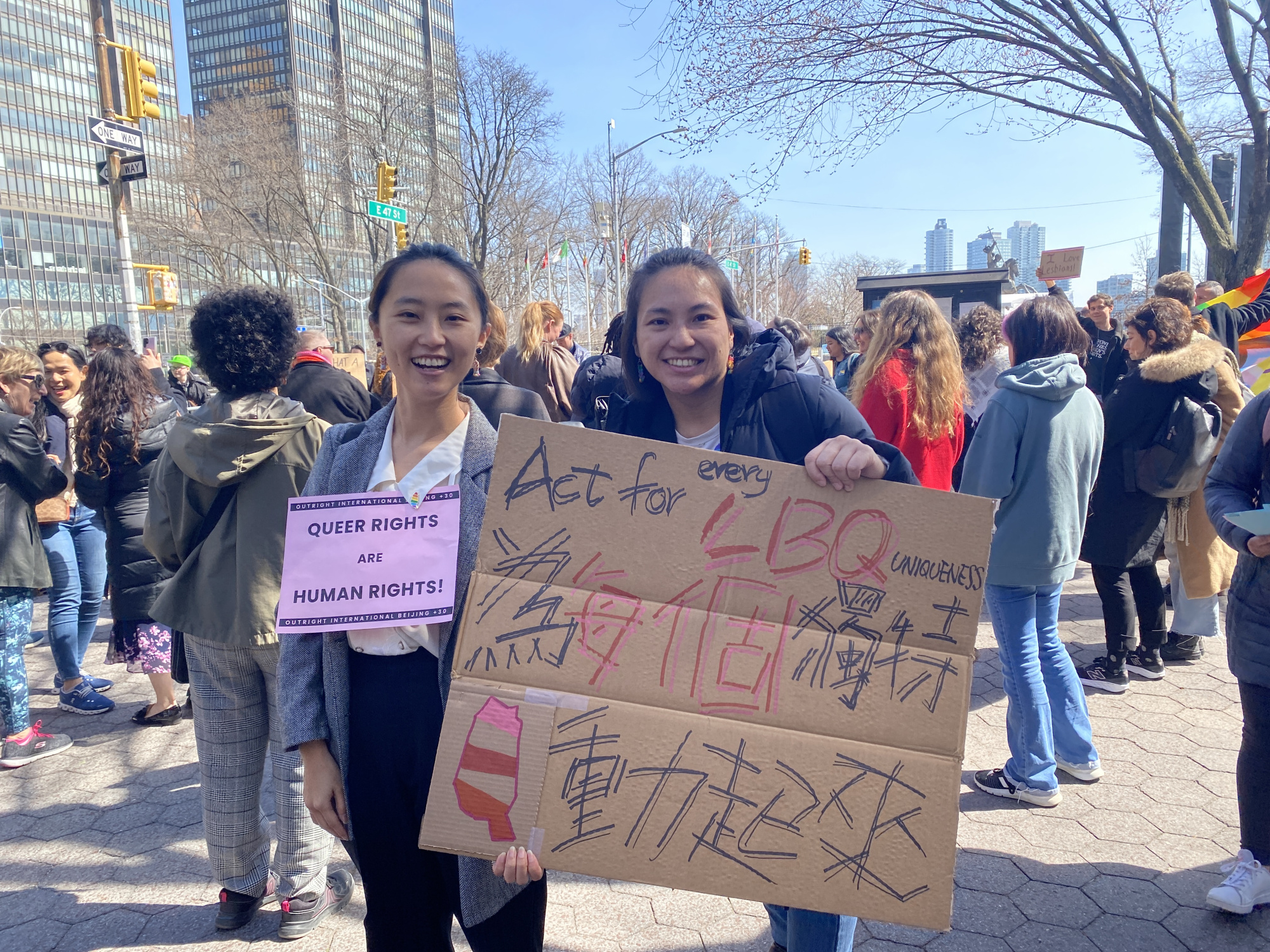
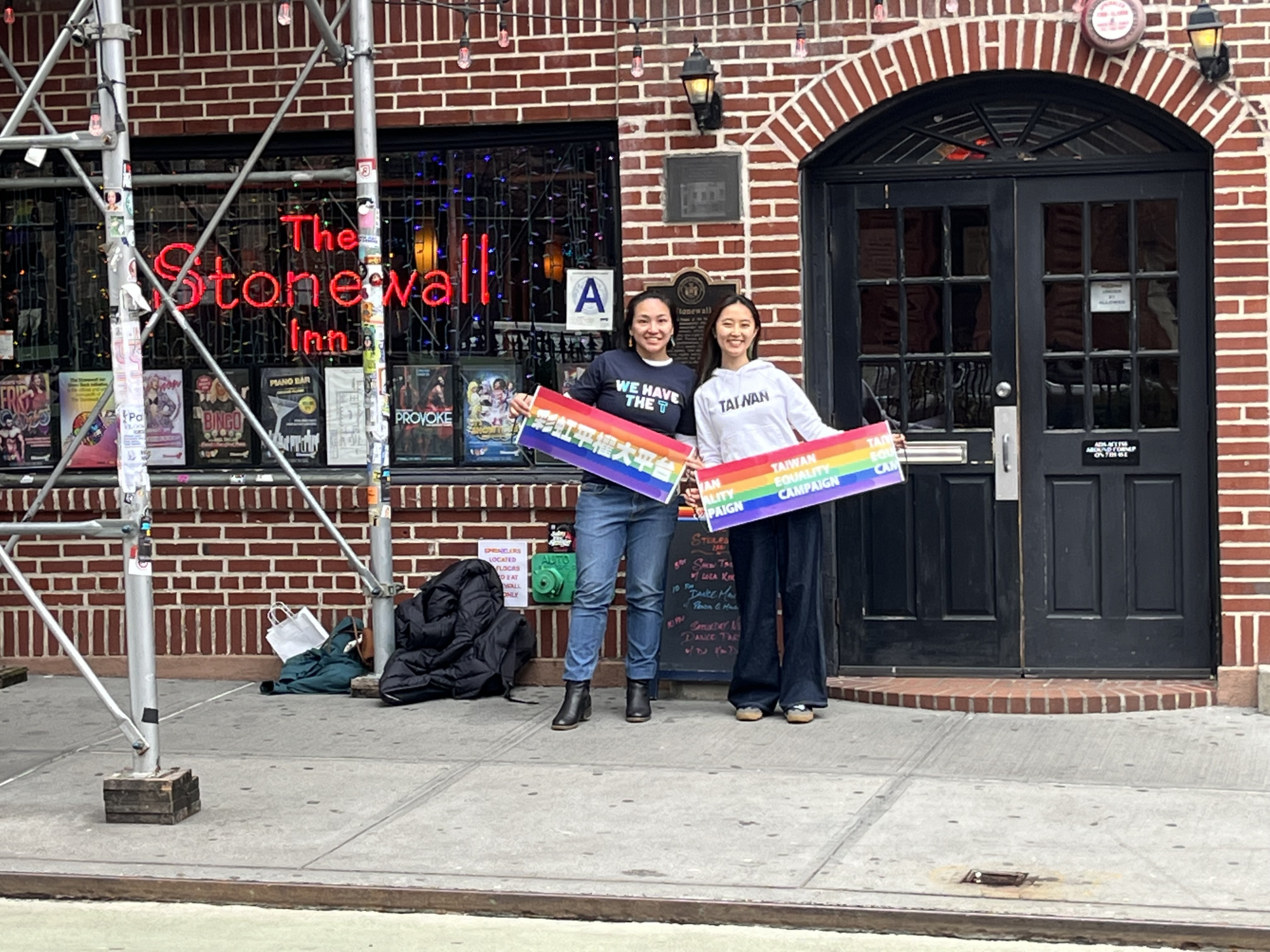
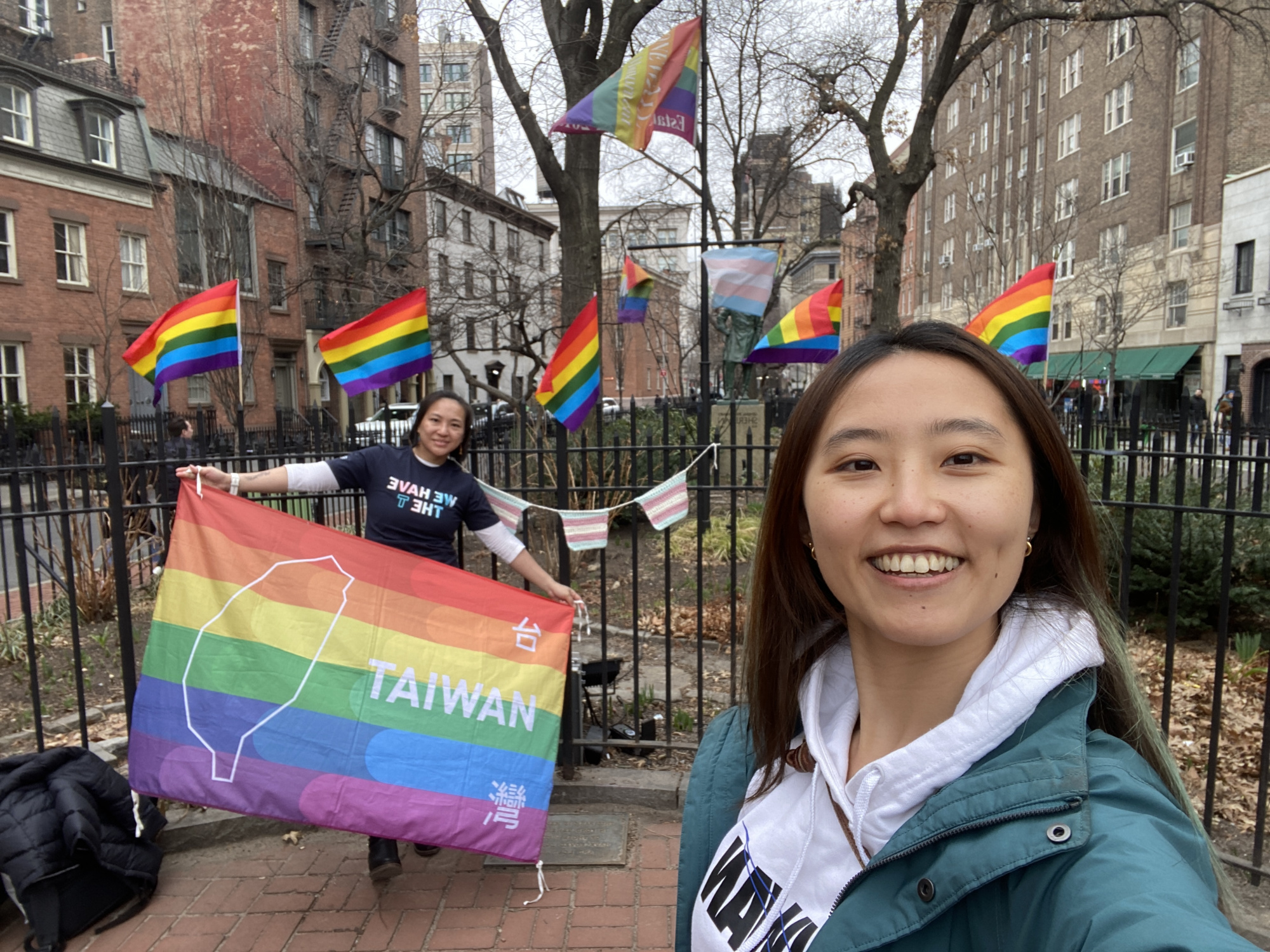
Outside the Conference: Visiting Stonewall, Joining the LBTI demonstration, and Being Proud of Taiwan!
It was the Taiwan Equality Campaign’s second time attending NGO CSW in person, gathering once again with international partners committed to human rights. This year, we strongly felt a shared sense of unease in response to the conservative policies introduced by the newly inaugurated U.S. administration. As one of the birthplaces of the global gender justice movement, New York City simultaneously hosted a number of human rights-related public gatherings during the week. Joyce and Yuanhsin participated in several activities outside of the formal meetings, immersing themselves in the broader social and political landscape.An LBTI demonstration was staged outside the conference venue in commemoration of the Beijing Declaration's 30th anniversary. With handcrafted signs that said "Act for Every LBQ Uniqueness 為每個獨特動起ニ" in both Mandarin and English, Joyce and Yuanhsin marched with others to highlight the strength of intersecting identities and plurality. Joyce shared a moving encounter with a lesbian rights pioneer who had participated in the original 1995 Beijing conference. She recalled the Lesbian Tent, where back then, many people were still unfamiliar with lesbian issues and identities, and how those early exchanges planted seeds of solidarity. Even thirty years later, many gender-diverse communities in countries around the world still face active oppression by their governments. This only reaffirms the need for open, global dialogue as the foundation for true equality.This trip to New York also included three key landmarks in LGBTQI+ history: the Stonewall Inn, the Stonewall National Monument Park, and the Stonewall National Museum, Archives & Library. Notably, after the Trump administration took office earlier this year, references to “QI+” were removed from the official website of the Stonewall National Monument. And yet, despite such symbolic erasure and the broader political assault on trans communities, the monument itself had become a spontaneous site of grassroots resilience. We witnessed people independently placing trans pride flags and handwritten signs throughout the area, honouring the contributions of trans communities to the gender justice movement. In the shadow of sweeping anti-gender aggression, people continue to create cracks in the system—finding space to resist, to show up, and to lift one another up. To witness these small yet powerful acts of solidarity on the streets of New York was deeply moving.
“We exist, but we are unspeakable; we have no name. Taiwan, in international politics, is the queerest of all nations.” This informative statement was offered by Naijia, who is currently on our board and was previously a researcher and podcast broadcaster. It was one of the main points of her master's thesis. As members of Taiwan's civil society and the international gender-diverse community, this condition of being—fluid, organic, resilient, and full of political vitality—encapsulates how we face the global political landscape: with tremendous tenderness, regret, and pride.

